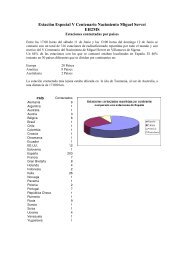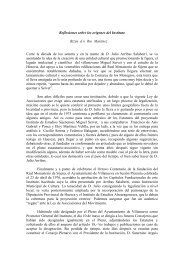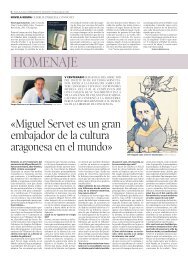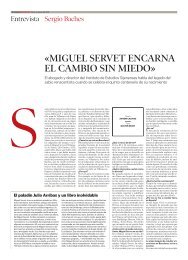New Page
New Page
New Page
You also want an ePaper? Increase the reach of your titles
YUMPU automatically turns print PDFs into web optimized ePapers that Google loves.
I.<br />
THE CHRISTOLOGY OF TRANSYLVANIAN ANTITRINITARIANS IN THE LATE 1560S<br />
Intellectual orientation in the first phase<br />
The framework described in the Preface significantly determined both the way Antitrinitarianism<br />
rose and unfolded during the period under discussion.1 It must be noted, however, that we have only<br />
sporadic data on the so-called latent period before 1566 and/or the antecedents. Therefore, it will<br />
immediately be a moot point to what extent the movement of Tamás Arany, who appeared with his<br />
Antitrinitarian spiritualistic ideas at the end of 1561, can be regarded as the forerunner of Transylvanian<br />
Antitrinitarianism.2 His views can be inferred indirectly only from a refuting tract by Péter Melius Juhász,<br />
Calvinist bishop of Debrecen, but recent studies have clearly established that his dogmatic system was<br />
different from the Antitrinitarianism unfolding at Kolozsvár, and could be compared mainly with that of<br />
Camillo Renato. Anyway, it is strange that the Transylvanian Antitrinitarians kept total silence about him,<br />
and no matter how much, as we shall see, they liked naming their forerunners, Arany's name cannot be<br />
found in any of their works.<br />
The most mysterious evidence of the latent period is contained in a letter from Ian Maczynski,<br />
secretary to Mikolaj Czarny Radziwill to Stanislaw Hosius on December 8, 1564.3 In that letter<br />
Maczynski recalls the contents of the epistles written to him from Transylvania by Blandrata and Ferenc<br />
Dávid. According to those, the Protestant churches in Transylvania and in Hungary rejected the technical<br />
terms of the Trinity, and even John Sigismund himself joined this view. Although recent literature on the<br />
subject is justified in considering this statement 'overoptimistic'4 since John Sigismund would join the<br />
Antitrinitarians much later, probably in 1569, the information concerning Ferenc Dávid should still make<br />
one pause. The least that can be claimed on the basis of it is that well before the overt appearance of<br />
Antitrinitarianism these ideas had been discussed in the circles closely surrounding Blandrata. This would<br />
seem to be supported by the evidence testifying to the sojourn of Blandrata's Italian colleagues in<br />
Transylvania. Both Gentile and Gianpaolo Alciati are certainly known to have paid visits to Transylvania<br />
after April, 1564, and Géza Kathona thinks it most probably happened in the second half of 1565.5 There<br />
must have been fiery debates at Kolozsvár in 1565 since a decision of the town council dated December<br />
21, 1565 mentions that recently many had appeared with false biblical interpretations, and these people<br />
would be allowed to stay in town only if they could defend their views against the preachers.6 It is also<br />
these discussions that the formation of Lukács Egri's views should be attributed to. He left Kolozsvár,<br />
where he had been active as a preacher since the late 1550s, in the spring-summer of 1565. In his native<br />
town Eger, outside the boundaries of Transylvania, he started preaching in a Antitrinitarian spirit,<br />
obviously under the influence of the ideas he had picked up at Kolozsvár.7<br />
The open appearance had thus been preceded by serious workshop activities and intellectual<br />
simmering, but it is the experiences Blandrata had gained at his previous stations, at Geneva and Poland<br />
that will have to be regarded as most important of all. With these experiences Blandrata first of all wanted<br />
to demonstrate that the traditional Trinitarian terminology had no origins in the Bible. He was of course<br />
well aware that the refusal of the +philosophical" terms meant questioning the whole of the traditional<br />
dogma, but he did not stress this point at all in the first period. Instead, he placed emphasis on biblicism,<br />
regarded as the common achievement of the Reformation, and it was by referring to biblicism that he<br />
argued for the consistent assertion of +sola scriptura". Of course, neither he nor his comrades could do<br />
without philosophical concepts, but it became possible to use these only when refuting the theses of their<br />
opponents or explaining their own statements. They, however, avoided non-biblical terms when<br />
formulating their views as a credo.<br />
8







